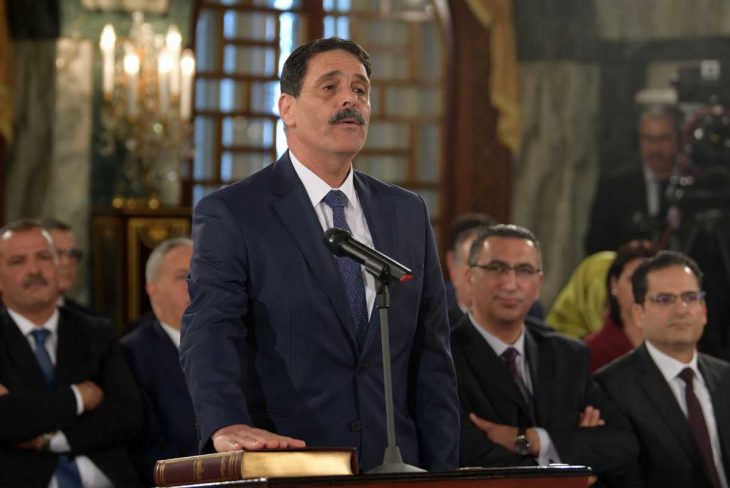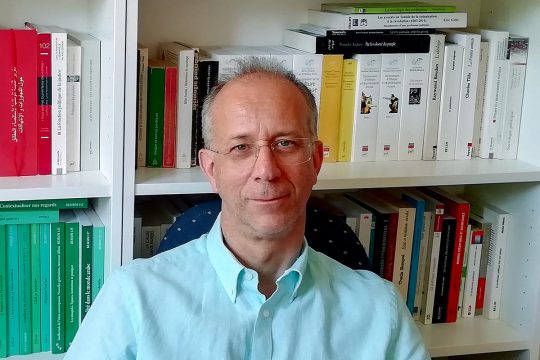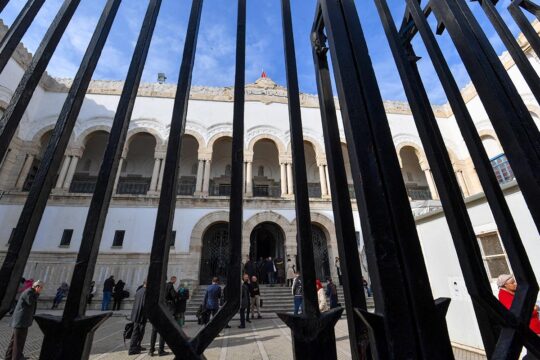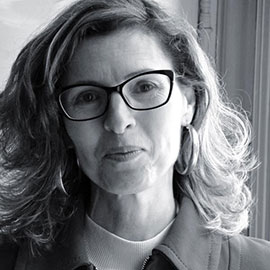(*) This interview was conducted one week after the IVD report was published in the Official Journal and before the resignation of Prime Minister Elyes Fakhfakh on 16 July due to a conflict of interest. This government will leave in 45 days.
We are not being asked to initiate reforms immediately, but rather to prepare a strategy for their implementation.
JusticeInfo.net: Now that you have published the IVD report, do you have a plan for implementing its recommendations?
Ayachi Hammami: According to the transitional justice law, the government must prepare a strategy and a work plan to implement the IVD recommendations within one year of the final report’s publication. We published the report on June 24, so the clock is now ticking. The methodology we’ve chosen is to set up a commission which will work with representatives of all the ministries and state institutions and members of civil society with human rights expertise and who are pro-transitional justice, such as the Tunisian Human Rights League, the Association of Tunisian Magistrates, victims’ coalitions and associations and so on. Together they will decide how to design the government plan, with reference to the report’s recommendations. This commission may divide its members into several sub-committees and call upon consultants and experts who can help it to better understand a specific problem, issue or case in relation to the IVD's final report. It must also take into account the financial possibilities of the State, bearing in mind that we are not being asked to initiate reforms immediately, but rather to prepare a strategy for their implementation.
Will the former commissioners of the IVD be part of this commission?
That is not ruled out. But their participation is not essential either, as they can be called on within the framework of the sub-committees to bring expertise in certain areas and knowledge of the report. Some, I believe, may be associated as members involved in civil society.
You have appointed the members of the Dignity Fund. When will they start providing reparations to victims?
The fund has already started operating. It is managed by a commission of eight members representing the Prime Minister's Office and the Ministries of Finance, Health, Social Affairs, Human Rights, Justice, Development and International Cooperation, as well as the State Litigation Officer. The nomination process started some time ago, so we have now finally completed it. The committee's first meeting took place last week. Its first task will be preparing an agreement to be co-signed by the Prime Minister and the Finance Minister on management procedures. 33,000 victims have been granted reparation decisions, of which 18,000 concern financial compensation and 15,000 rehabilitation. Lists will be drawn up by the commission to classify victims according to region, gender, age and the degree of damage suffered. Financial compensation varies from one person to another and is based on objective criteria established by the Truth Commission and cited in its report. It is true that victims whose reparations decisions date back more than a year have felt frustrated, particularly after the closure of the Truth Commission. Now they have someone to turn to.
We shouldn’t expect to see the start of victim compensation in the short term. I think it will take quite a long time to start that work.
The State has allocated 10 million dinars to the Dignity Fund. This is insufficient given the number of victims, so how will you find the rest of the money?
The 10 million dinars will be used to set up the administration that will be in charge of the Dignity Fund, with its logistics and employees. The most biggest resources will come, as the decree recommends, from donations, gifts and unconditional legacies, whether national or foreign. According to the information and contacts we have, countries such as Germany and Switzerland, which have supported the process in Tunisia, are ready to donate funds. Moreover, we shouldn’t expect to see the start of victim compensation in the short term. I think it will take quite a long time to start that work. We should not forget that Tunisia is currently going through an acute financial crisis, its coffers are practically empty. But the victims have no intention of robbing the state, many are rather looking for rehabilitation or even recognition. The rehabilitation of victims can also take the form of an economic project in their favour that aims to develop an entire region, their region. This will give us the opportunity to rehabilitate both the victim and the victim region. In this case, the beneficiary will be supported by state structures during the various phases of the project, to guarantee its success. This type of investment goes beyond the individual who has suffered human rights violations, reaching out to the entire region.
The victims are in all regions. Do you plan to decentralize the administration of the funds to facilitate access to the beneficiaries?
It's not out of the question. When the Fund's management commission starts its work, it will probably identify the likely problems and decide on solutions. My role as minister is to respond to the needs of this commission, to facilitate its work and not to supervise or control it. On the other hand, it should be noted that there is a government structure called the Department for Veterans, Martyrs and Wounded of the Revolution and Victims of Terrorism. This body has regional offices. This is where the victims who have not received their reparation decisions from the IVD, i.e. almost 5,000 people, will be able to retrieve these documents. They will no longer have to travel to Tunis to claim them.
Ten years after the revolution, Tunisia has still not published the official list of martyrs and wounded from the events of January 2011 in the Official Gazette. There is still a dispute over this list, which is contested by many victims. How can it be resolved?
I myself am personally concerned that, ten years on, Tunisia still does not have an official list of its martyrs and wounded -- as if the revolution had not taken place! This issue is complex and ambiguous and requires a lot of caution. Very soon after the revolution, the commission of investigation into the violations and abuses committed by the forces of law and order, chaired by Taoufik Bouderbala, was set up and published a report. In this document, which was the reference in the first years after January 2011 to obtain reparations and free care and transport cards, the number of dead was estimated at 337 and the number of injured at 3,000. The IVD, for its part, has drawn up its own list of 111 martyrs [people who died]. The first list of the inquiry commission on violations and abuses was contested, so the Constituent Assembly promulgated a law in 2012 setting up a commission to draw up a list of the wounded and martyrs of the revolution, chaired once again by Taoufik Bouderbala. The commission posted the names of the identified victims on its website in October 2019. It mentions 120 martyrs and 600 wounded. This provoked an outcry, all the more so as some of the wounded with judgments in their favour published by the Military Tribunal since 2013 did not find their names on that list. The installation of this government of which I’m a member at the end of February coincided with the outbreak of the coronavirus crisis, hence the postponement of this issue. Today, we are encountering differences of opinion among NGOs representing the wounded and the families of the martyrs: some are asking us to publish the latest list of the Bouderbala Commission quickly in the Official Gazette, and others are saying that if we do, the wounded forgotten by this recent report are threatening to commit suicide. We therefore thought about allocating a little more time to this very divisive issue and broadening consultations on it before making a final decision. I am listening to the various proposals. Some feel that the revolution must be generous with its children and those who provoked it, that it should avoid bureaucratic accounting and compensate everyone, including those hit by stray bullets in front of their homes. Others dispute this point of view. They distinguish between the 80 prisoners who died during the revolution as they tried to escape after provoking a mutiny, and the peaceful demonstrators killed during the angry days of winter 2010-2011. Are the police and military who fell at that time victims or executioners? Finding convincing answers to all these questions is no easy task.
Among the recommendations in the IVD report there are several ideas and proposals for national remembrance. Have you worked on that issue?
We believe a nation that does not learn from its past will make the same mistakes, including a return to tyranny, because it will simply forget what happened on its own soil. Hence the importance of preserving memory. This will probably be one of the tasks of the commission designing the government's action plan.
The old system hasn't completely disappeared. Its networks and lobbies, especially in the media and the administration, are a great blocking force. As for the new system, it is stumbling and sometimes falling short.
How do you explain that revealing the truth and rehabilitating the victims in particular are encountering so much resistance?
I would like to refer to the famous quote by the Italian writer and philosopher Antonio Gramsci - "while the old world is dying, the new world is slow to appear". We are in this complex in-between. The old system hasn’t completely disappeared. Its networks and lobbies, especially in the media and administration, are a great blocking force. As for the new system, it is stumbling and sometimes falls short as a force of resistance to obstacles. Diversity also characterizes "the new world" in Tunisia, an effect of democracy whose essence is multiple political sensibilities. However, this climate does not favour rapid decision-making.
Post-revolutionary governments have also been slow in establishing transitional justice. Instead of inaugurating a process, the government that emerged from the first free elections on 23 October 2011 set up a Ministry of Human Rights and Transitional Justice, which gave impetus to the project of drafting a law on transitional justice. This was a way to buy time. It was only after a long series of regional consultations in 2012 and 2013 on the new legislation that the Truth and Dignity Commission was established in June 2014. This slowness in setting up an accountability mechanism made it possible for the old guard to return in force. There’s been mismanagement of time and the historical opportunity offered in the aftermath of the revolution. The other reason that made the process difficult was the boycott of the Commission by several categories of victims, especially people on the political left. They rejected it, criticized it, even defamed it. It took the IVD warning of its impending closure for victims in that mould to submit their files to the Commission.
The trials of the specialized chambers are also slow. What can your ministry do to speed up the judicial process, which still suffers from the absence of the accused?
I am informed that the last three trials that took place after the publication of the final IVD report have seen the arrival of the accused. This demonstrates the impact of political will on transitional justice. What can I and my colleagues in the government do other than facilitate the work of the justice system and encourage it to issue warrants to bring the accused?
There are hundreds of victims who have not managed to convince the administration of their right to get their careers back. In Tunisia, judges and lawyers have been trained in transitional justice. Shouldn't the same be done with the administration?
This depends once again on the political will of those who lead the administration. That will exists today, unlike in the past!
The President’s apologies to the victims are much awaited. When do you think they will be forthcoming?
I'm waiting for them too. But I have no idea when they will come. What I am certain of is that he will make a formal apology on behalf of the state, as provided for in the transitional justice law. I think this will be an honour for him and an achievement in terms of the international image of our country.
Interviewed by Olfa Belhassine








